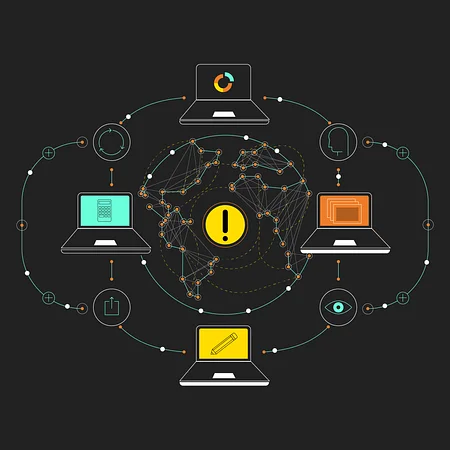Do you have enough technology understanding in your Compliance team?

GDPR, MiFID II, Solvency II, SCA, PSD2, Brexit… The past decade has been pretty hard on Compliance teams if not only for all the acronyms they need to remember.
Overnight, they developed a paper mountain of stress and an unfair reputation for slowing everything down. Since 2008, financial regulations rocketed by a jaw-dropping 500%, hitting financial services where it most hurts – their wallet!
Today the average bank shells out between six and ten percent of their overall revenue just on compliance, according to the Risk Management Association. For the global players, this will be hundreds of millions every year. Ouch!
Yet, throwing money at doing the same thing over and over is not fixing the problem. There’s simply too much to get through. Too many checks, stamps, approvals, reviews, sign-offs, feedback loops and goodness knows what else. Even before COVID-19, it was excruciatingly clear that humans in Compliance were having to spend precious time doing a robot’s work.
When it comes to most Compliance and admin processes, technology can do a better job than humans, there’s no doubt there. illustration of this point, IBM have just announced general availability of their IBM Cloud for Financial Services, a cloud with pre-configured security and regulatory compliance controls built-in to its services that can enable Banks to continuously monitor compliance around the clock, integrate every kind of fintech you could think of and safeguard data. Show me a human who can do that.
It’s painfully obvious that the only way out of this hole is to use technology much more efficiently and effectively but until recently that has been easier said than done.
COVID-19 served our industry with yet another obvious reminder to hurry up with overdue digital transformation but when we zoom out and look at the bigger picture, we see a dire need to digitally transform coupled with overwhelming willingness to do so.
So, what’s holding people back still?
My theory? A mixture of a lack of time and digital skills.
Compliance teams are caught between a rock and a hard place. They are overrun with a backlog of work, but lack the technology understanding needed to maximise the potential of digital. Learning these sanity-saving skills is an investment which they need, and they know they need, but this takes significant time. Time being the one thing they don’t really have right now. This is the vicious circle nobody asked for.
90% of employees today need some form of digital reskilling, according to our friends over at CBI. But when it comes to compliance, it’s not just learning how to unmute on a Zoom call or saving a file in a shared drive. We’re talking fairly advanced technical knowhow, combined with years of compliance expertise in order to turn Compliance from a department who deals with the “burden” of regulations to those who can seek advantage in the chaos.
To benefit from AI process automation - which has the power to unchain entire teams from standardised back office procedures - Compliance must know where the boundaries of sci-fi are and what is actually possible, and then feel confident using the tech to make it happen. They’ll need to understand and apply digital language on top of compliance jargon, in everyday real-time cases. And, as we know, these are not things they can afford to get wrong.
Cloud-based tech has the power to unshackle Compliance from years of unnecessary work. But only if the tools are right, and more to the point, in the right hands.
My solution? Embrace the Cloud and hire more tech talent.
Technology has embedded into all things. Every single business and every single department in a business is impacted by technology. There is no getting away from it. Technology understanding needs to be everyone's secondary skill set as it takes the theory into practice. The more skilled your teams are with technology the greater your chances of thriving rather than just surviving in this period.
Businesses in this period have to upskill while not taking their foot off the pedal. We have regulations to adhere to and regulators who won't take “we were retraining the whole team”, as a good answer to why we are not compliant.
Cloud-based tech has the power to unshackle Compliance from years of unnecessary work.
To solve this problem one-stop-shop tech services like IBM offer consultants and trainers, and they do a lot of the work for teams as part of the package. This breaks the vicious cycle and gives Compliance the time and space they need to learn how to make workloads more efficient.
BNP Paribas are a good example of embracing this approach. The folks at the top have just signed a deal with IBM to implement the Cloud across its systems. As I type, IBM is uploading the bank’s 40+ financial programmes onto the Cloud from their Paris office.
This doesn’t just save a bunch of time for Compliance and keep things organised. It also means that new fintech services can be easily added. Multiple tasks can run at once. Things become more secure and more transparent. Teaching employees how to use new technology and unhinging banks from their dated old systems opens a world of opportunities. Right now we can only imagine what innovation this will bring.
When you find a way to reduce the amount of admin, it benefits everyone. It frees up Compliance teams to do what they do best, unleashing them to apply their hard-earned expertise towards business growth. Instead of drowning under mountains of paperwork, they can be sitting in strategic meetings, offering invaluable advice to speed up launches and service.
Compliance is ripe for innovation, and the bank with the best people on-hand will surely race ahead of competition. It’s not about replacing jobs, it’s about giving your staff better-suited jobs to enhance the business - and leaving the box-ticking robot work to robots.
Look at employing people who studied artificial intelligence before they’d ever heard of KYC. People who needed to use the words “quantum computing” in their dissertation. You may well end up with a lot more t-shirts and sandals, than ill-fitting suits wandering around the office space but embrace it.
You never know how much you could achieve as a result.
Learn more about IBM Cloud for Financial Services here.
This blog post was kindly sponsored by IBM.




